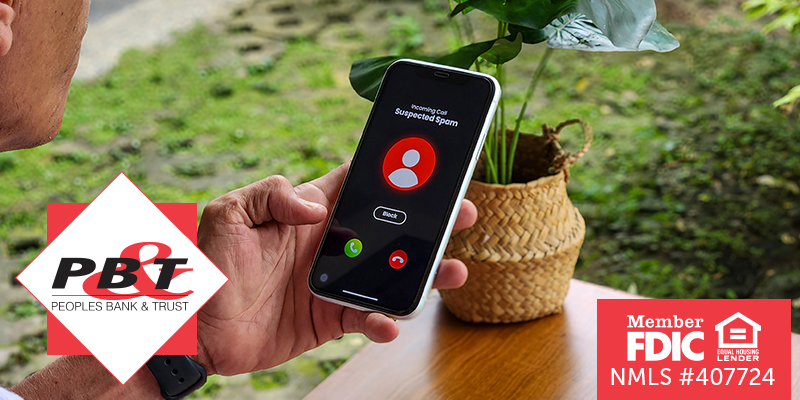Peoples Bank & Trust
Updated Mon August 25, 2025
Published Under: Cyber Security Security

Picture this: You’re sipping your morning coffee when your phone lights up. It’s your bank — or so a scammer wants you to think. The caller ID looks legitimate. The voice on the other end is polite, professional, and even knows your name. They claim there’s been suspicious activity on your account.
Your heart skips a beat.
Before you share any personal details, take a breath. This could be a spoofing scam — and these days, they’re more convincing than ever.
Read About:
- What Is a Spoofing Scam?
- How a Spoofing Scam Might Sound
- Red Flags to Watch For
- What PB&T Will Never Do
- Stay Scam-Savvy
What Is a Spoofing Scam?
Spoofing happens when scammers falsify their caller ID, email sender, or text message name to make it look like they’re contacting you from a trusted source, like Peoples Bank & Trust.
These scams are designed to sound urgent and official, pressuring you to hand over sensitive information such as:
- Your account number
- Online banking password
- Personal Identification Number (PIN)
- One-time passcodes sent to your phone
Remember: PB&T will never call you unexpectedly to request this type of information.
How a Spoofing Scam Might Sound
A typical scam script might go like this:
Scammer: “Hi, this is Sam from Peoples Bank & Trust’s Fraud Department. We’ve detected unusual activity on your account ending in 1234. For your protection, we need to verify your identity. Can you confirm your full account number and the code we just texted you?”
Sounds official, right? But here’s the truth: We will never ask for your full account number or a one-time passcode over the phone.
Red Flags to Watch For
Even if the caller ID says it’s from us, these warning signs should raise your suspicion:
- Urgency or threats like “Your account will be locked if you don’t act now!”
- Requests for sensitive info such as your PIN, password, or full account number
- Pressure to transfer money to a “safe” account
- Caller discourages you from hanging up or calling back
- Unusual payment requests, including gift cards or wire transfers
What PB&T Will Never Do
Our team will never:
- Ask for your full account number
- Request your PIN or password
- Ask for a one-time passcode
- Request remote access to your device
- Demand immediate transfers to “secure” accounts
If someone does? Hang up — it’s a scam.
Stay Scam-Savvy
Spoofing scams are sneaky, but with awareness, you can spot them before they cause harm. When in doubt, stop, verify, and protect your information.
More Fraud Prevention Tips: This is the first in PB&T’s scam awareness series. Watch for upcoming posts on text message scams, phishing emails, and social media fraud so you can stay ahead of the criminals. Bookmark this blog and check back!
Peoples Bank & Trust Co.
Member FDIC, Equal Housing Lender
NMLS #407724
Comments